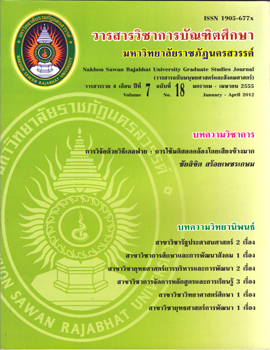นโยบายสาธารณะที่มีผลกระทบต่อครอบครัวไทยยุคใหม่ ตามแนวคิดของมิเชล ฟูโกต์
Main Article Content
Abstract
บทคัดย่อ
การวิจัยเชิงคุณภาพครั้งนี้มีวัตถุประสงค์ดังนี้ 1) เพื่อศึกษา วิเคราะห์นโยบายของรัฐที่เกี่ยวกับครอบครัว ภายใต้กรอบแนวคิดอำนาจหลังสมัยใหม่ 2) เพื่อทราบและเข้าใจถึงวาทกรรมครอบครัว ปฏิบัติการแห่งอำนาจของวาทกรรมครอบครัว 3) เพื่อทำความเข้าใจปฏิบัติการแห่งอำนาจที่เป็นอื่นผ่านตรรกะของคู่สมรสที่ไม่ต้องการมีบุตรใช้วิธีการศึกษาจากหนังสือ เอกสาร การสัมภาษณ์เชิงลึก และการสังเกตแบบมีส่วนร่วมกับคู่สมรส 5 คู่ซึ่งไม่ต้องการมีบุตร ที่ได้จากการสุ่มตัวอย่างด้วยวิธีการเฉพาะเจาะจง
ผลการวิจัยพบว่า
1. นโยบายของรัฐสนับสนุนวาทกรรมครอบครัวซึ่งใช้ในการควบคุมพฤติกรรมของครอบครัวไทย โดยเป็นทั้งผู้สร้างและผู้ผลิตซ้ำวาทกรรมครอบครัว
2. วาทกรรมครอบครัวแทรกอยู่ในนโยบายที่เกี่ยวกับครอบครัวซึ่งปรากฏอยู่ในแผนพัฒนาเศรษฐกิจและสังคมแห่งชาติ นโยบายประชากรและการวางแผนครอบครัว ในวาทกรรมที่เป็นชุดความรู้ด้านการแพทย์และจิตวิทยา ด้านกฎหมาย และศาสนา
3. ในการต่อต้านขัดขืนอำนาจวาทกรรมครอบครัวกระแสหลัก ความคิดที่จะไม่มีบุตรเกิดขึ้นได้ทั้งก่อนและหลังการแต่งงาน ผู้เริ่มต้นเป็นได้ทั้งฝ่ายชายและฝ่ายหญิง โดยมีที่มาที่แตกต่างกันและพัฒนาในลักษณะค่อยเป็นค่อยไป สู่การเป็นตรรกะของครอบครัว ทั้งยังมีการพัฒนาตรรกะเพิ่มเติมภายหลัง ตรรกะในการต่อต้านขัดขืนที่ค้นพบมีเนื้อหาอยู่ภายใต้วาทกรรม ครอบครัวรูปแบบใหม่ เหตุผล ความสัมพันธ์ ความเป็นพ่อ-แม่ และศาสนา
Abstract
The objectives of this qualitative research were: 1) to study and analyze government policy about family according to power in postmodern perspective, 2) to perceive and understand the discourse of family and discursive practice of power of family’s discourse, and 3) understand the discursive practice of other power by logic of the couple who don’t want to have a child.
The research methods were documentary research, in-depth interview and participant observation with 5 couples, who don’t want to have a child by intention, as key informant’s sampling.
The findings of this research were as follows:
1) The policy of the government had supported the discourse of controlled behavior of the Thai families in both reproduced and constructed roles.
2) The discourse of families in mainstream had been viewed through the National Economic and Social Development Plan, the population policy, family planning policy, and knowledge about medical advocacy to the public, family psychology , legal process and religious institutions .
3) In the resistance of the mainstream discourse, the idea of no child family took place in both before married and after married. The one who does not want to have a child first might be a husband or wife and they have different sources of idea. The logics supported the no child family idea had been developed gradually from individual to family, and new logics also were constructed. The logics of their resistance were classified into 5 discourses: new pattern family, rationality, relation, parenthood, and religion.


